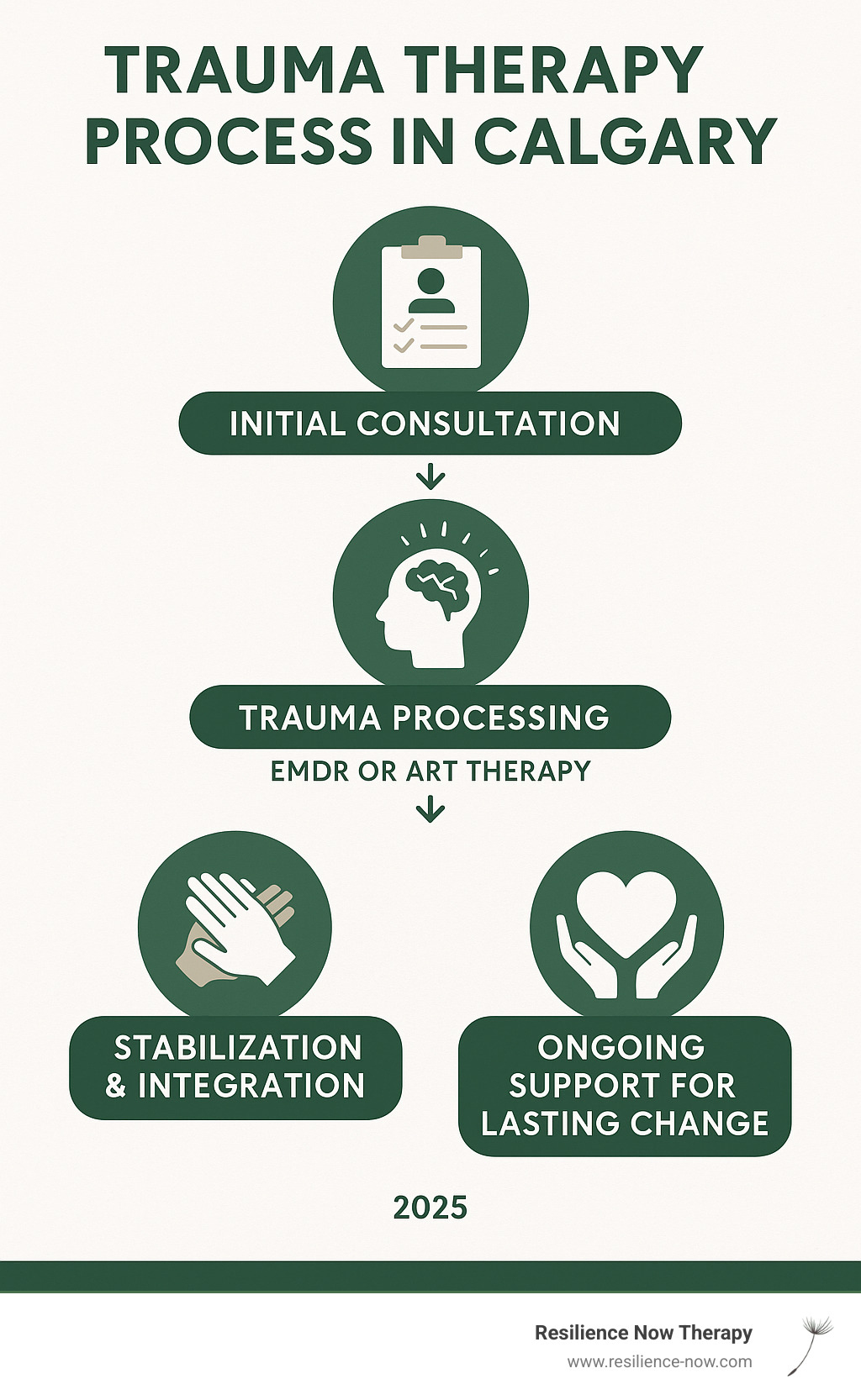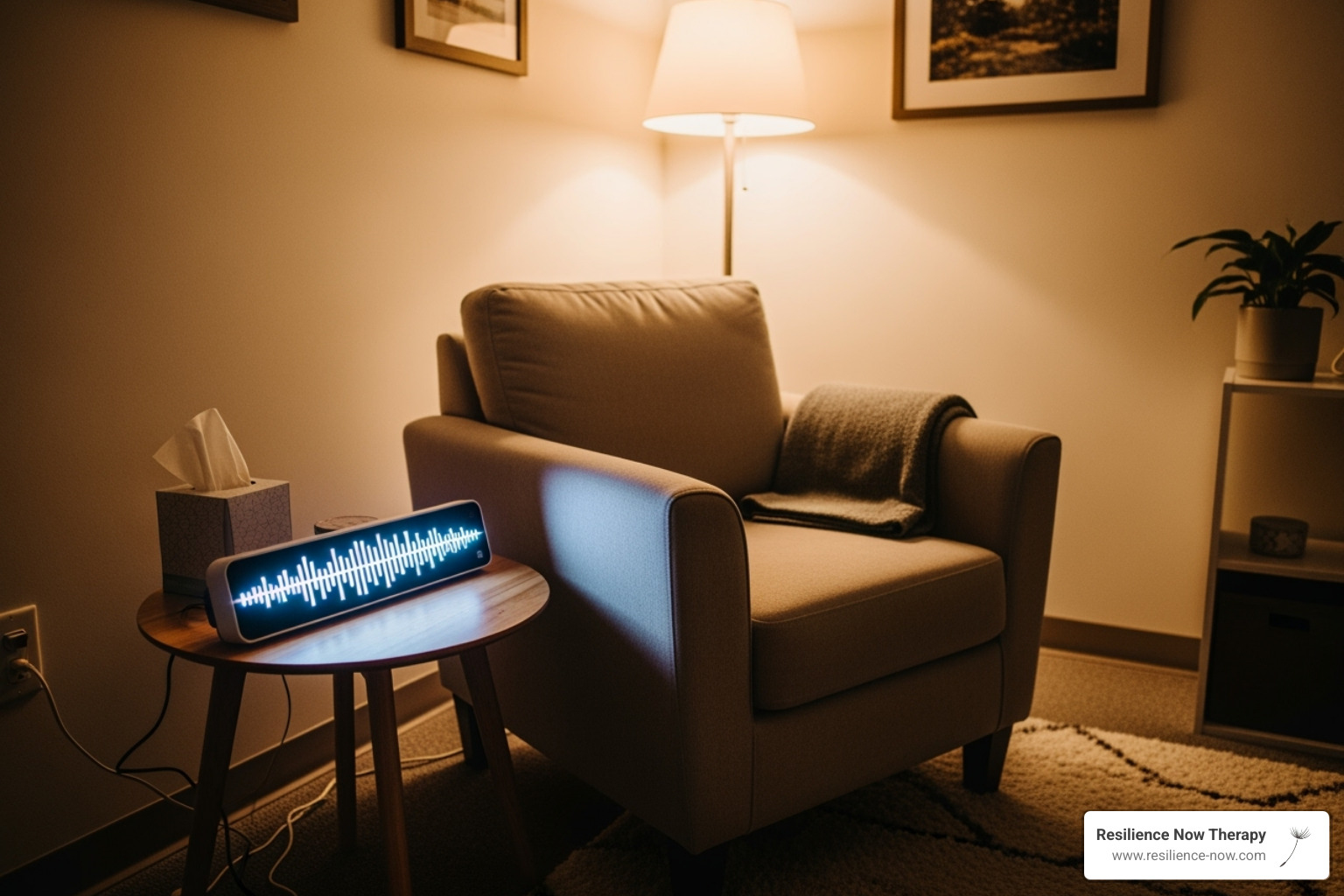Trauma Therapy Calgary: Your Path to Healing and Recovery

Understanding Your Need for Trauma Therapy in Calgary
If you're a successful woman who appears to have it all together on the outside but struggles internally with racing thoughts, anxiety, and emotional overwhelm, you're not alone. Trauma therapy in Calgary offers specialized support for individuals navigating the lasting effects of overwhelming experiences. What you're experiencing isn't a sign of weakness—it's your nervous system's attempt to protect you after difficult events.
Trauma represents your mind and body's response to distressing experiences that overwhelmed your capacity to cope, often creating feelings of powerlessness. It affects everyone differently, and what matters isn't the severity of the traumatic event, but how your system responded and whether you had adequate support to process it. These impacts can result in long-term changes to your thoughts, behaviors, and emotional responses, significantly affecting your overall well-being.
At Resilience Counselling and Consulting in Calgary, we specialize in trauma therapy for women who struggle with anxiety and emotional pain beneath their successful exterior. Our approach combines evidence-based therapies like EMDR and Accelerated Resolution Therapy to help you move from surviving to truly thriving within a supportive environment.
The Hidden Nature of Trauma in Successful Women
If you're reading this, you may feel that something is "off" despite your outward achievements. You might wonder if your struggles are significant enough to warrant professional help. Here's what I want you to understand: psychological trauma isn't solely about what happened to you—it's about what occurred inside you when your capacity to cope became overwhelmed.
Trauma can stem from a single traumatic event or the gradual accumulation of traumatic stress, such as workplace harassment or growing up with unpredictable caregivers. Childhood trauma, in particular, can have lasting psychological effects that shape your emotional responses and healthy coping mechanisms well into adulthood.
For many accomplished women, trauma affects daily functioning while concealing itself behind perfectionism and people-pleasing behaviors. You've mastered functioning beautifully externally while your nervous system remains trapped in survival mode. Understanding your trauma history is crucial, as past traumatic experiences influence your current mental health and stress responses.
How Trauma Manifests in High-Achieving Women
Trauma presents itself in numerous ways, and you don't require a specific diagnosis to benefit from trauma counselling. When trauma occurs in our lives, its effects can persist long after the traumatic event, impacting your brain's structure, function, and emotional regulation capabilities. These trauma related symptoms can significantly impact your everyday life and emotional well being.
Post-Traumatic Stress Disorder (PTSD)
Post traumatic stress disorder can develop following exposure to serious harm, characterized by symptoms like flashbacks and hypervigilance. PTSD develops when traumatic events feel severe, threatening, or when adequate ongoing support wasn't available afterward, significantly impacting emotional, physical, and relational well-being. PTSD symptoms may include intrusive memories, difficulty focusing, and physical pain that seems unexplained.
Complex Trauma
Complex trauma often results from repeated harm within relationships where you should have felt safe, such as childhood abuse or emotional abuse. It can profoundly affect your self-worth and ability to form meaningful connections with others. Unlike a single traumatic event, complex trauma creates deeper patterns that require specialized trauma focused therapy approaches.
Traumatic Stress Disorder and Acute Stress Disorder
Traumatic stress disorder encompasses various responses to overwhelming experiences, while acute stress disorder represents immediate reactions following a traumatic event. Both conditions benefit from trauma informed therapy approaches that address how trauma affects your mind and body.
If you constantly anticipate others' needs or feel perpetually inadequate, these underlying trauma patterns might be influencing your everyday life and relationships.
Understanding How Trauma Affects Your Brain and Body
When your brain detects danger, it activates your survival system through fight, flight, or freeze responses. Trauma can cause this system to become stuck in the "on" position, leaving you in chronic hyperarousal. Your brain's alarm system (the amygdala) becomes overactive, while the area responsible for clear thinking (the prefrontal cortex) can go offline when triggered.
This neurological response explains why you might experience anxiety seemingly without cause, struggle with concentration, or find your mind going blank under stress. These aren't personal shortcomings—they're your brain's protective mechanisms working overtime to manage triggers and keep you safe.
Your body also stores traumatic experiences through your nervous system. Chronic stress activation can manifest as fatigue, headaches, digestive issues, muscle tension, sleep disturbances, and chronic physical pain. Research consistently demonstrates the profound mind-body connection in trauma, highlighting why addressing both psychological and physical symptoms is essential for comprehensive healing.

Recognizing Symptoms of Unresolved Trauma
Trauma related symptoms can be subtle and are frequently mistaken for personality characteristics. If several of these experiences resonate with you and interfere with your daily functioning, it may be time to seek trauma counselling and ongoing support:
Emotional Symptoms
- Persistent anxiety or worry about future traumatic events
- Feeling emotionally numb or disconnected from the present moment
- Irritability followed by guilt
- Overwhelming sadness or mood swings
- Difficulty with emotional regulation and managing intense feelings
Physical Symptoms
- Chronic fatigue without clear medical cause
- Unexplained aches and physical pain
- Sleep disturbances or insomnia
- Being easily startled by unexpected sounds or movements
- Digestive issues or appetite changes
Behavioral Symptoms
- Avoiding specific people, places, or situations that remind you of trauma
- Overworking to stay constantly busy and avoid difficult emotions
- People-pleasing behaviors to feel safe in relationships
- Difficulty making decisions or trusting your judgment
Relational Symptoms
- Challenges trusting others or forming close connections
- Pushing people away when they get too close
- Inability to set healthy boundaries
- Fear of abandonment or rejection
These responses aren't character flaws—they represent a nervous system that adapted intelligently to difficult circumstances. With appropriate support from trauma therapists, healing is absolutely achievable.

The Transformative Benefits of Trauma Therapy
Choosing trauma therapy represents a courageous step toward reclaiming your life. My approach to treating trauma focuses on more than symptom management—it's about facilitating deeper healing that transforms your relationship with yourself and the world around you.
Creating Safety and Trust
One of trauma therapy's most profound benefits is establishing a safe environment where healing can occur. For many trauma survivors, safety has been compromised in significant relationships. In my practice, I prioritize building a secure therapeutic relationship as the foundation for all healing work.
Within this supportive space, you can gently process overwhelming experiences so painful memories lose their emotional intensity. Your reactions and coping strategies are validated and understood, helping you shift from self-blame toward self-compassion and acceptance.
Developing Resilience and Effective Coping Strategies
Trauma often leaves individuals feeling overwhelmed and powerless. Therapy provides a pathway to developing genuine resilience and new coping strategies. You'll acquire practical tools to regulate emotions, calm your nervous system, and manage anxiety without becoming overwhelmed.
For high-achieving women who tend toward self-criticism, cultivating self-compassion through the healing process becomes transformative. The goal extends beyond alleviating symptoms to empowering you to live authentically aligned with your values and aspirations.
Reconnecting with Yourself and Others
Trauma can create profound disconnection from yourself, your body, and meaningful relationships. Trauma therapy in Calgary helps bridge these gaps by processing past hurts and learning to reconnect with the present moment. This work enables you to improve relationships, establish healthy boundaries confidently, and rebuild your capacity for trust and intimacy.
As your healing journey progresses, the protective walls that trauma constructed begin dissolving, reducing isolation and fostering genuine belonging and connection.
Evidence-Based Approaches to Trauma Therapy
After years of working with women who've experienced trauma, I understand there's no universal solution. Your trauma is as unique as your fingerprint, which is why I don't employ one-size-fits-all approaches. Effective healing requires a personalized treatment plan tailored specifically to your needs, goals, and comfort level.
This personalized approach reflects trauma-informed care principles, meaning I understand how trauma affects your mind and body while prioritizing your safety and choice throughout the therapeutic process.
Eye Movement Desensitization and Reprocessing (EMDR) Therapy
EMDR therapy has revolutionized trauma treatment and is recommended by the World Health Organization for treating trauma and post traumatic stress disorder. Rather than extensively discussing traumatic memories, EMDR uses bilateral stimulation (such as guided eye movements) to help your brain reprocess disturbing experiences.
This therapeutic technique mimics the natural processing that occurs during REM sleep. The goal is memory reprocessing without reliving every painful detail. While traumatic memories don't disappear, they lose their emotional charge—like viewing an old photograph rather than reliving a distressing traumatic event. You can acknowledge what trauma happened without the intense physical and emotional reactions.
Accelerated Resolution Therapy (ART)
If you're seeking a structured and potentially faster therapeutic approach, Accelerated Resolution Therapy might be ideal. ART uses guided visualization and bilateral stimulation to help your brain reprocess difficult emotions while allowing you to replace negative images with positive ones, giving you control over your mental landscape.
This rapid, structured approach often produces significant shifts within just a few sessions. A key advantage is that deeper healing can occur without sharing every painful detail aloud—the processing happens internally at your own pace.
Somatic Therapy and Body-Based Approaches
Somatic therapy recognizes that trauma affects not just the mind but the entire body. This approach helps you reconnect with physical sensations and develop healthy coping mechanisms that address how traumatic stress is stored in your nervous system. Somatic therapy techniques can be particularly effective for those who experience physical symptoms related to their trauma.

Integrating Mind and Body with Advanced Therapeutic Modalities
While EMDR and ART are powerful interventions, comprehensive healing sometimes requires integrating additional modalities to address how trauma affects both mind and body:
Internal Family Systems Informed Therapy: Using IFS approaches, we work with different aspects of yourself to achieve balance and internal harmony.
Trauma-Informed Stabilization Treatment: This approach helps stabilize your nervous system and build essential coping skills before engaging in deeper trauma processing work.
Observed and Experiential Integration Therapy: OEI helps you reconnect with your body and integrate fragmented experiences, addressing how trauma is physically stored.
Parts Work: This therapeutic approach recognizes that we all have different internal parts or aspects of ourselves that developed in response to life experiences, helping you understand and heal these various parts.
Having these diverse tools allows us to create a truly personalized healing journey that honors your specific needs, timeline, and therapeutic goals while addressing the unique challenges you face.
Overcoming Common Barriers to Seeking Help
While trauma therapy is a powerful recovery tool, many people face obstacles that make reaching out challenging. You might worry about the stigma of seeking trauma counselling, struggle to find the right therapist, or feel constrained by scheduling limitations.
Fortunately, trauma therapy in Calgary is increasingly accessible. I offer both in person and online sessions, making it possible to receive specialized support from the comfort of your home when that feels most appropriate. Flexible scheduling, including evening appointments, helps ensure that even those with demanding lives can prioritize their healing process.
Whether you're dealing with post traumatic stress, the lingering effects of childhood abuse, or current overwhelming traumatic stress, taking the first step toward therapy is an act of self-care and courage.
Managing Triggers and Difficult Emotions in Daily Life
Living with trauma often means facing unexpected triggers that can disrupt your everyday life. These responses are common for those who have experienced traumatic memories and can make it challenging to feel safe or in control. The good news is that trauma therapy offers practical tools to help you manage anxiety and navigate difficult emotions as they arise.
Techniques such as eye movement desensitization and bilateral stimulation can help your brain process traumatic memories, reducing the intensity and frequency of triggers. Incorporating relaxation techniques—like deep breathing, progressive muscle relaxation, or grounding exercises—can calm your nervous system and help you stay connected to the present moment.
By learning to recognize your triggers and practicing these coping strategies, you can regain control over your mental health and reduce the impact of traumatic stress on your emotional well being. Remember, learning to manage triggers is a skill that develops with ongoing support, allowing you to move through everyday life with greater confidence and resilience.

Your Therapeutic Journey: What to Expect
Beginning trauma therapy can feel like a significant step, but the healing process is designed to be clear and comfortable. Taking that initial step is often the most challenging part, but once you begin, therapy can become a sanctuary in your busy life—a space that's entirely yours for healing and growth.
Your Complimentary Consultation
Choosing the right therapist is deeply personal, so I offer a free 15-minute phone consultation to help you feel confident in your decision. This warm, no-pressure conversation allows us to get acquainted. You can share what's bringing you to trauma therapy, ask questions about my approach, and determine if you feel understood and supported.
The simple onboarding process can be completed from your home's comfort, fitting seamlessly into your schedule rather than creating additional stress in your everyday life.
The First Session and Beyond
Our therapeutic work is a collaborative partnership. Your first appointment is a 50-minute intake session where we engage in a guided conversation to understand your trauma history, strengths, and goals. We'll explore your story at your pace, without pressure to share details you're not ready to discuss.
Together, we'll establish goals that extend beyond symptom relief to help you create the fulfilling life you truly desire. I typically schedule sessions weekly or biweekly, as consistent attendance provides the momentum necessary for meaningful change. I may also offer between-session practices and reflections to help you integrate insights into your daily life while providing ongoing support throughout your healing journey.
Understanding Treatment Duration
One common question is about therapy duration. The honest answer is that treatment length varies based on your individual needs, trauma history, and goals. My focus remains on facilitating deeper healing rather than providing quick fixes. While symptom relief can occur relatively quickly, transforming long-standing patterns requires time and commitment.
For women wanting to accelerate their healing process, I offer EMDR Intensive sessions. This concentrated healing experience involves longer, more frequent sessions over a focused period, allowing for deeper processing and breakthrough moments in treating trauma.
How to Choose the Right Trauma Therapist
Finding the appropriate calgary trauma specialist is one of the most crucial decisions in your healing journey. It involves finding someone with proper expertise who also makes you feel safe, understood, and supported throughout the process.
Essential Credentials and Qualifications
When searching for trauma therapists, specific qualifications are vital. Extensive trauma experience is critical, as it requires specialized approaches that differ significantly from standard talk therapy. Look for certifications in evidence-based modalities like EMDR and ART, as well as training in cognitive behavioural therapy and prolonged exposure techniques.
As a Certified EMDR Therapist, I've completed extensive training and consultation, demonstrating advanced competency in trauma treatment. A trauma-informed practice approach is also essential, ensuring your therapist prioritizes your safety, choice, and empowerment throughout the therapeutic process while understanding how trauma affects your daily functioning.
The Therapeutic Relationship
Research consistently demonstrates that the therapeutic relationship quality is the strongest predictor of successful treatment outcomes. Feeling safe, understood, and genuinely supported is fundamental to healing. Effective therapy occurs within a collaborative partnership where you remain the expert on your own life and traumatic experiences.
Finding the right personality and approach fit also matters significantly. This is why I offer a complimentary consultation—so you can experience my therapeutic style and determine if we're a good match for your healing journey.
Online vs. In-Person Therapy Options
Modern therapy offers flexibility in how you receive care. Both online and in person trauma therapy are highly effective, and the best option is the one that works optimally for your unique circumstances and preferences.
Online therapy provides remarkable flexibility and convenience, allowing you to access specialized trauma counselling from anywhere in Alberta. For some individuals, being in their familiar environment makes exploring vulnerable topics feel safer and more comfortable.
In person sessions offer the benefit of a dedicated healing space and direct connection that some people prefer for their therapeutic work. I provide both formats to ensure your therapy fits seamlessly into your life and supports your healing goals while addressing your specific mental health needs.
Beginning Your Journey to Resilience and Healing
If you've been carrying the weight of past traumatic experiences for too long, please know that trauma is treatable, and you can reclaim your life and emotional well being. Your struggles with anxiety, perfectionism, and people-pleasing aren't character flaws—they're intelligent adaptations your nervous system created to help you survive difficult circumstances.
While these patterns once served important protective functions, they may now be limiting your ability to live fully and authentically. Trauma therapy in Calgary offers a clear path forward through personalized approaches using evidence-based therapies like EMDR and Accelerated Resolution Therapy.
This therapeutic work can help your nervous system learn that it's safe to relax and experience life differently. This isn't about merely coping with symptoms—it's about facilitating deeper healing that changes your relationship with yourself and others while providing you with new coping strategies for managing triggers in everyday life.
Imagine waking up without that familiar anxiety, setting healthy boundaries without guilt, and trusting your own judgment completely. You deserve to feel genuinely at home in your own skin and to live a life that reflects your authentic self and values, free from the ongoing impact of past trauma.
The healing process requires courage, but you've already demonstrated incredible strength by considering this step. You don't have to continue carrying this burden alone or let traumatic stress control your emotional well being.
Ready to begin your healing journey? I invite you to contact me for a free consultation. This brief, no-pressure conversation is an opportunity to ask questions, explore how trauma therapy can support you, and take that first brave step toward the life you truly want to live.
Your healing matters, and you deserve ongoing support in reclaiming your peace, confidence, and joy. Let's explore how trauma therapy can help you move forward with greater resilience, self-compassion, and authentic connection to yourself and others.


